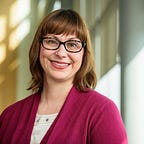Doc Hoff’s Blog Blog Project | “When Tragedy Strikes”
The first post-Midterm blog of the #BlogBlogProject, where I post the views and observations of my students at the University of Delaware, focuses on anti-Semitism. Amelia Abemayor, a senior International Relations major with minors in Political Communication and Jewish Studies, reflected on the personal impact of the recent shooting at a Pittsburgh synagogue. Read her blog, rated as Top Blog of the Week by her peers, below.
~ Dr. Hoffman
— — — — —
Throughout my life, being Jewish has played a crucial role in shaping my identity. Whether it was attending after-school religion classes three days a week or celebrating various Jewish holidays throughout the year with my extended family, my Judaism has allowed me to not only grow spiritually, but also intellectually and culturally. Growing up in a primarily Jewish suburb of New York, I was privileged enough to rarely experience any form of antisemitism. Though, from time to time, I’d see swastikas drawn on school bathroom walls or overhear crude jokes, I never felt as if I couldn’t overcome these lewd acts of hatred. As the great-granddaughter of Holocaust survivors, I have always felt as if displaying my Jewish pride (whether it be through wearing a Star of David or observing Jewish laws) would be my personal contribution to honoring the generations that came before me who endured years of persecution. Along with this pride came my patriotism for being an American Jew. Given my surroundings while growing up, I had always felt safe to be Jewish and attributed that to the fact that I was born in America. To me, the United States was a place I could embrace my Judaism and truly feel accepted within society.
Unfortunately, this all changed in the summer of 2017. After seeing the infamous Charlottesville “alt-right” protests broadcast across the media, my once naive self began to truly question my American Jewish identity. For the first time in my life (which, I recognize, is a complete privilege), I felt a wave of hatred hit me solely because of who I was. I began to feel less and less patriotic, and felt that I had to hide aspects of my Jewish identity. Furthermore, after hearing our President’s remarks on the protests — stating that there were both good and bad people on both sides — I felt isolated by our government and the values I had once thought it embraced.
Though I struggled for quite a while, I did come around and begin to rebuild my Jewish pride. I convinced myself that the protests were a “freak of nature” rather than a result of anti-Semitism in America, and carried on with the confidence that this was not an epidemic within the United States. But then, a year following the protests, it happened again. On October 27th, a gunman entered a synagogue in Squirrel Hill, Pittsburgh and killed 11 people while shouting anti-Semitic slurs. Within minutes of hearing the news, I felt just how I had felt a year prior but this time, it seemed to be more of a wake-up call. My years of naive thinking came to a halt and I questioned how this country could be in this place in 2018. Though I felt hopeless, I did feel somewhat of a call to action.
For our National Agenda class, we are required to read The Righteous Mind: Why Good People are Divided by Politics and Religion by Jonathan Haidt. In his chapter entitled “Why are we so groupish?” Haidt examines the characteristics of group dynamics. Because of the collective power that comes from a group coming together — whether it be at a concert or as a result of a tragedy, humans tend to band together when an experience is shared. As an example of this, Haidt cites the experience of people at a rave experiencing a sense of euphoria off the high of being within a group of people.
Though not a positive situation, the mass shooting in Pittsburgh brought Jews together from all walks of life — old and young, reform and orthodox, American and non-American — to come together as a call to action. Just like Haidt explains, as a result of a group’s dynamic (in this case, the group being Jews), coming together due to a shared experienced can have a powerful effect thus leading to a call to action. A day after the tragedy, NBC published an article entitled, “Former Tree of Life synagogue calls for action after shooting.” In this article, Rabbi Chuck Diamond says that “Everybody feels like they were attacked in that synagogue,” and that the Jewish community at large has “to overcome the hate which is surrounding us.” Many other news outlets featured sentiments of a call to action as a result of the shooting (like this one from the Washington Post).
From vigils to protests to lobbying for gun control, Jews as a group began to collectively take action against the rise of antisemitism in this country. Though we still have a long way to go, the collective action taken over the last few weeks from “my group” is what truly motivates me to embrace my Jewish pride.
— — — — —
This blog was written by University of Delaware senior Amelia Abemayor, a senior International Relations major with minors in Political Communication and Jewish Studies. It was written as an assignment for the National Agenda “Midterm Matters” course.
